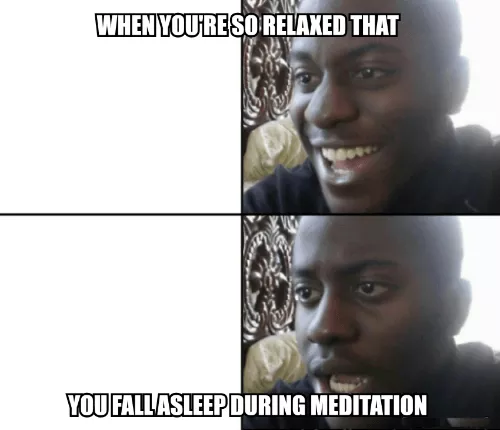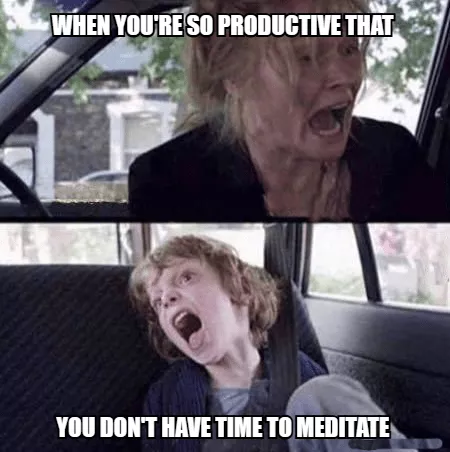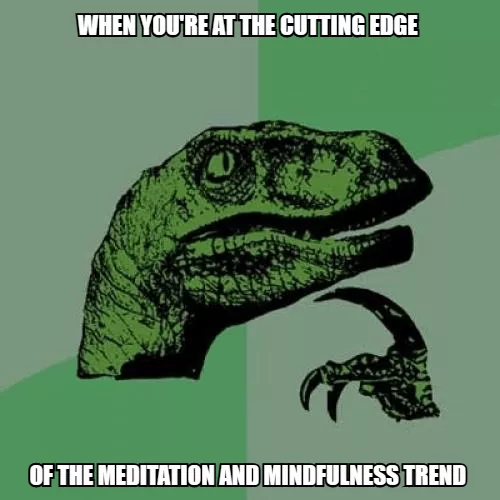Power of Meditation Memes – Funniest Ways to Stay Zen In a Crazy World

You might be referring to a meme that has meditation as its theme or focus. A meme is a piece of online content—typically a picture or a video—that is extensively shared with the aim of making people laugh or disseminating a specific idea or message. Memes can range from straightforward text-based jokes to more intricate visual media, and they can be made for a variety of reasons.
On the other hand, meditation is a technique that involves concentrating one’s attention on a certain thing, idea, or activity in order to increase awareness and mental clarity. It has been demonstrated to offer a number of advantages, including lowering stress and anxiety, enhancing sleep, boosting attention, and increasing mindfulness. It has been practiced for millennia in many countries and traditions as a way to promote mental and physical well-being.

More Meme –Funny Meditation Memes
A person who practices meditation trains their attention and awareness by focusing on a certain object, idea, or action in order to create a mentally clear, emotionally tranquil, and stable condition. Meditation has been practiced for millennia for a number of reasons, including spiritual and religious as well as for its possible health advantages, in many countries and traditions. There are numerous varieties of meditation, each with unique methods and objectives. Some popular types of meditation include mantra meditation, which involves repeating a word or phrase to help quiet the mind, mindfulness meditation, which involves concentrating on the present situation without judgment, loving-kindness meditation, which involves sending good vibes to themselves and others, and mantra meditation.
Related Article – The Trend of Meditation meme & quotes

Tips for Staying Alert During Meditation
People frequently sleep off while meditating, especially if they are worn out or stressed out. There are a few ways you might attempt to stay awake during meditation if you discover that you frequently nod off:
- Pick a moment when you are more awake and alert to meditation. You can stay alert by practicing meditation, for instance, first thing in the morning or after a cup of coffee.
- A comfortable position that enables you to remain awake is to be found. If you discover that you frequently nod off while sitting up, consider lying down.
- Set a timer or alarm to remind yourself to stay awake.
- In order to stay awake and attentive, try a more active form of meditation like yoga or walking meditation.
- Set aside another time for rest or relaxation if you are still having trouble staying awake when meditating. It’s crucial to pay attention to your body’s needs for rest and relaxation.

Personalizing Your Meditation Practice
It’s usual to experience ups and downs in your meditation practice, as well as times when you don’t feel the need or want to meditate. If you’re seeing this, try some of the following:
- Take a break: If you feel like you need one, you are free to stop practicing meditation. Sometimes taking a break may allow you to return to your practice with more excitement and vigor.
- Test out other approaches: Try something different if your present meditation routine is making you feel uninspired or bored. There are many different meditation methods available, so you may select one that speaks to you more.
- Think about the advantages of meditation: Recall the advantages of meditation that you have already enjoyed. These might include enhanced sleep, more self-awareness, and an improvement in serenity and clarity.
- Find assistance: To help you stay motivated, think about joining a meditation group or finding a meditation partner. Having a practice partner may be a fantastic source of inspiration and support.
Keep in mind that meditation is a personal practice, and what is effective for one person might not be effective for another. It’s acceptable to take breaks and try out various methods to determine which one suits you the most.

It’s natural for your thoughts to stray while you’re meditating, and it’s also common to lose track of time or struggle to recall specific details afterward. It can take time and regular practice to improve your focus and concentration when practicing meditation, which requires training your attention and awareness.
It’s also crucial to remember that the purpose of meditation is to develop a sense of presence and awareness in the present moment rather than necessarily recalling specific details. Setting an intention for your meditation session and letting go of the need to recall exact specifics later on can both be beneficial.
It might be beneficial to speak with a specialist in mental health or a meditation teacher for more advice if you are having trouble remembering things after meditation and it is worrying you. They can provide suggestions for enhancing your meditation practice and assist you in understanding any potential root issues.

During meditation, it is normal for people to have a sense of serenity and stillness that can occasionally extend to the inability to feel their heart beating. This is typically nothing to worry about and is just a side effect of the relaxation response that is frequently brought on by meditation.
However, it is crucial to consult a doctor if you are worried about your heart rate or have any other symptoms that are worrisome to you. They can evaluate your general health and identify any underlying medical conditions that require treatment.
In general, it’s crucial to keep in mind that each person’s meditation experience is diverse, and it’s common for people to have various feelings and experiences both during and after meditation. It could be beneficial to consult a meditation teacher or a healthcare expert for advice if you are new to meditation and unclear of what to anticipate.

That you enjoyed your meditation experience is wonderful to hear! Meditation is a technique that involves training the attention and awareness by focusing the mind on a certain object, thought, or action. It can have various advantages for the body as well as the mind. Some people discover that meditation makes them feel more at ease and serene. It can also help them sleep better, reduce tension and anxiety, and feel happier and more content overall. There are several different techniques and approaches to meditation that you may try if you’re seeking to incorporate it into your everyday life, including guided meditations, loving-kindness meditation, and mindfulness meditation.

Finding the Right Meditation Technique for You
There are numerous varieties of mindfulness and meditation techniques, including:
- A single object or experience, such as your breath, a mantra, or a candle flame, is the focus of a focused attention meditation.
- In open monitoring meditation, you watch your thoughts and feelings without passing judgment on them. You also let them come and go without getting sucked into them.
- Sending yourself and others feelings of love and compassion is part of the loving-kindness meditation.
- During a body scan meditation, you lie down and bring awareness to every part of your body, beginning with your toes and moving up to the top of your head.
There are numerous techniques to practice meditation and mindfulness, including seated meditation, walking meditation, yoga, and other forms of exercise. However, it is also possible to incorporate many such practices into your daily life in smaller ways, like by taking a few deep breaths before starting a task or pausing to fully engage with your senses while eating a meal. Many people find it helpful to set aside a dedicated time and space for meditation and mindfulness practices.

Many different factors influence people’s decision to meditate. Some people use meditation to find a sense of peace and tranquility, as well as to improve sleep, focus, and concentration. Some people meditate in order to feel better overall or to get in touch with their inner selves. Additionally, some people employ meditation to deal with mental or physical discomfort.
A rising collection of evidence points to the numerous physical and mental health advantages of meditation. These advantages can include lowered blood pressure, enhanced immune system, and diminished signs of worry and sadness. Additionally, enhanced happiness and well-being as well as better sleep may be linked to meditation.
No matter your age or level of expertise, anyone can practice meditation. There is no need for specialized gear or equipment, and it may be done in a peaceful setting. Many people discover that making time for meditation a regular part of their schedule can help them develop a steady routine.

More Meme –Funny Meditation Memes
Finding Time for Meditation in Your Busy Life
It makes sense that you might not always have time for meditation, especially if your calendar is full. But even if it’s just for a little while at a time, it’s crucial to find methods to incorporate rest and self-care into your daily schedule. Here are some pointers on how to fit in meditation even when you’re busy:
- Set aside time each day to meditate. Pick a time that suits you most, such as right before bed or first thing in the morning.
- Make it a routine. You’ll find that meditation gets simpler and has more advantages as you practice.
- Choose a peaceful area. Although you don’t need a specific room or area to meditate, it might be beneficial to select a calm and serene spot to sit or lie down.
- Utilize a meditation guide. If you’re pressed for time, consider a quick guided meditation that just takes a few minutes to complete.
- Include brief meditations in your daily routine. It’s not necessary to schedule a lengthy period of time to meditate. While sitting in traffic or standing in line, you can quickly and easily decompress by taking a few deep breaths or paying attention to your breath.
Always keep in mind that the secret is to discover a meditation routine that suits your needs and fits into your daily routine. The effects of even a brief period of mindfulness can be felt throughout your entire being.
Being in the present moment entails putting your attention there rather than worrying about the past or the future. It entails being focused in the present and preventing daydreaming or distractions. Being present can increase your sense of clarity, calmness, and grounding as well as enhance your relationships and general wellbeing. Practices like mindfulness meditation, yoga, and other mindfulness techniques can help you develop a present-moment focus. You can also do things like painting, gardening, or playing an instrument to fully engage your senses and your attention. Setting aside certain periods each day to practice being present, such as taking a few deep breaths and concentrating on your breath or just taking a moment to enjoy your surroundings, may also be beneficial.
Top Meditation pages on Facebook & Instagram
- uwomind_
- buddhasmemefolder
- gaiameditation

